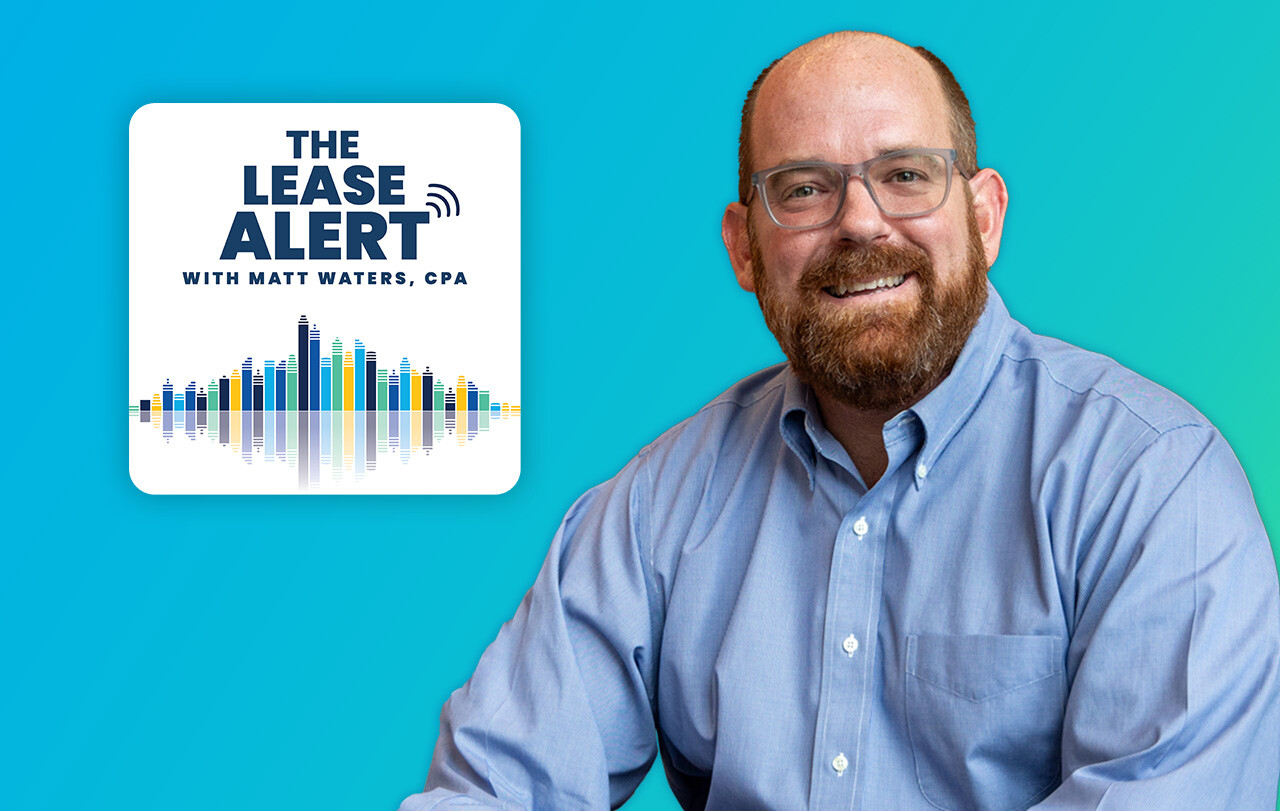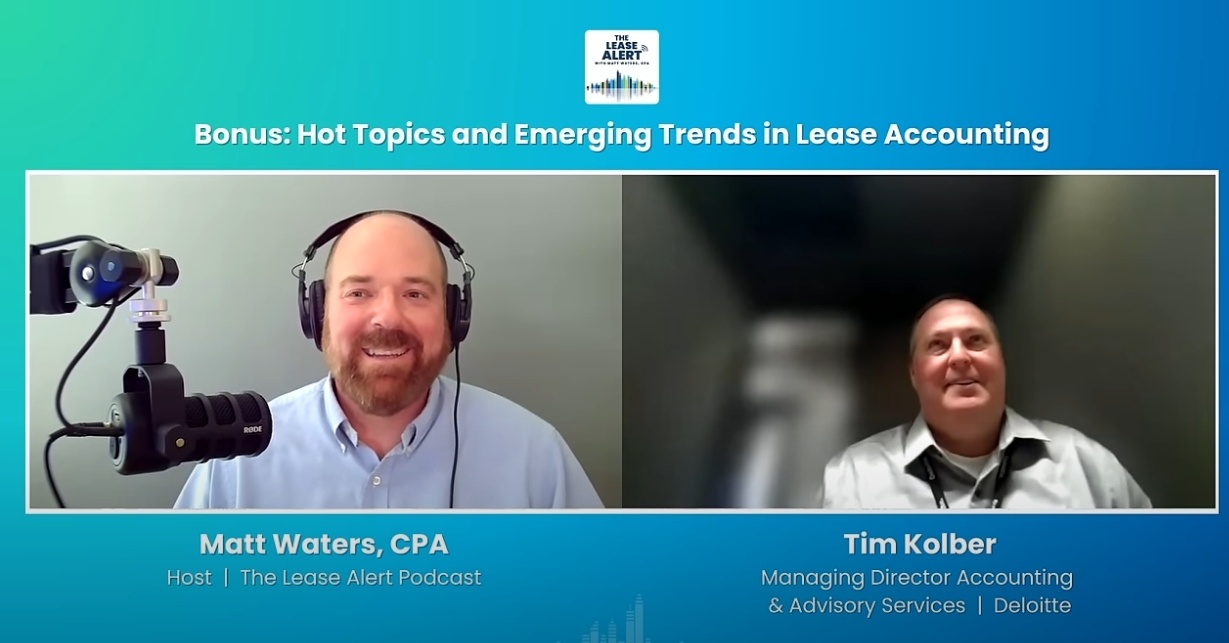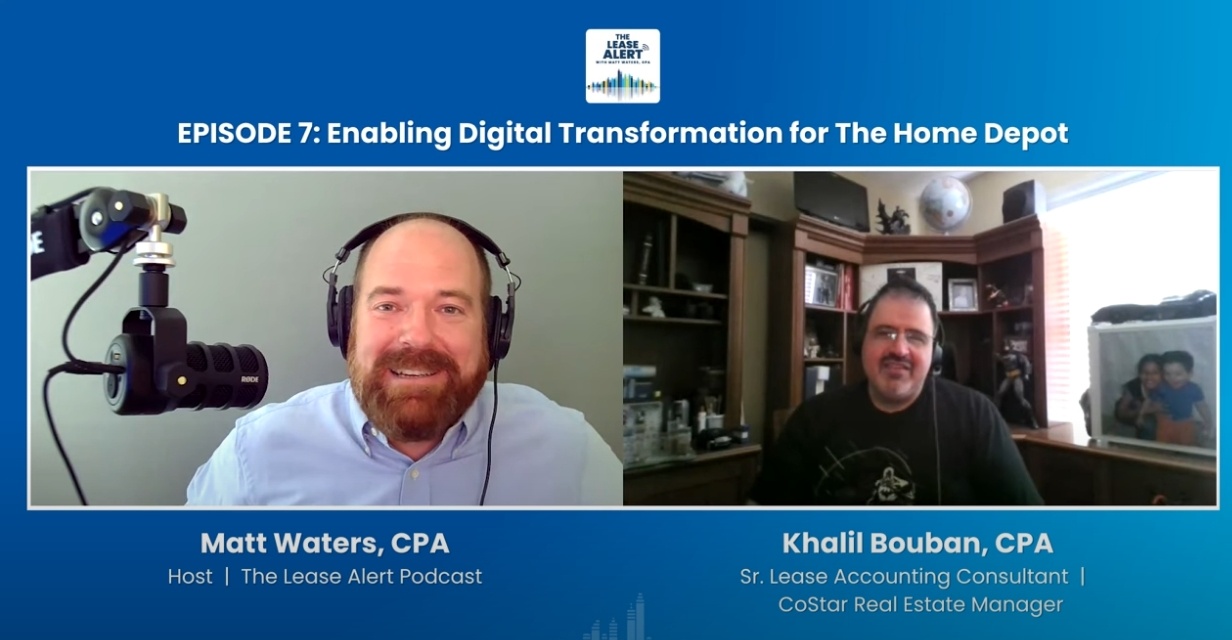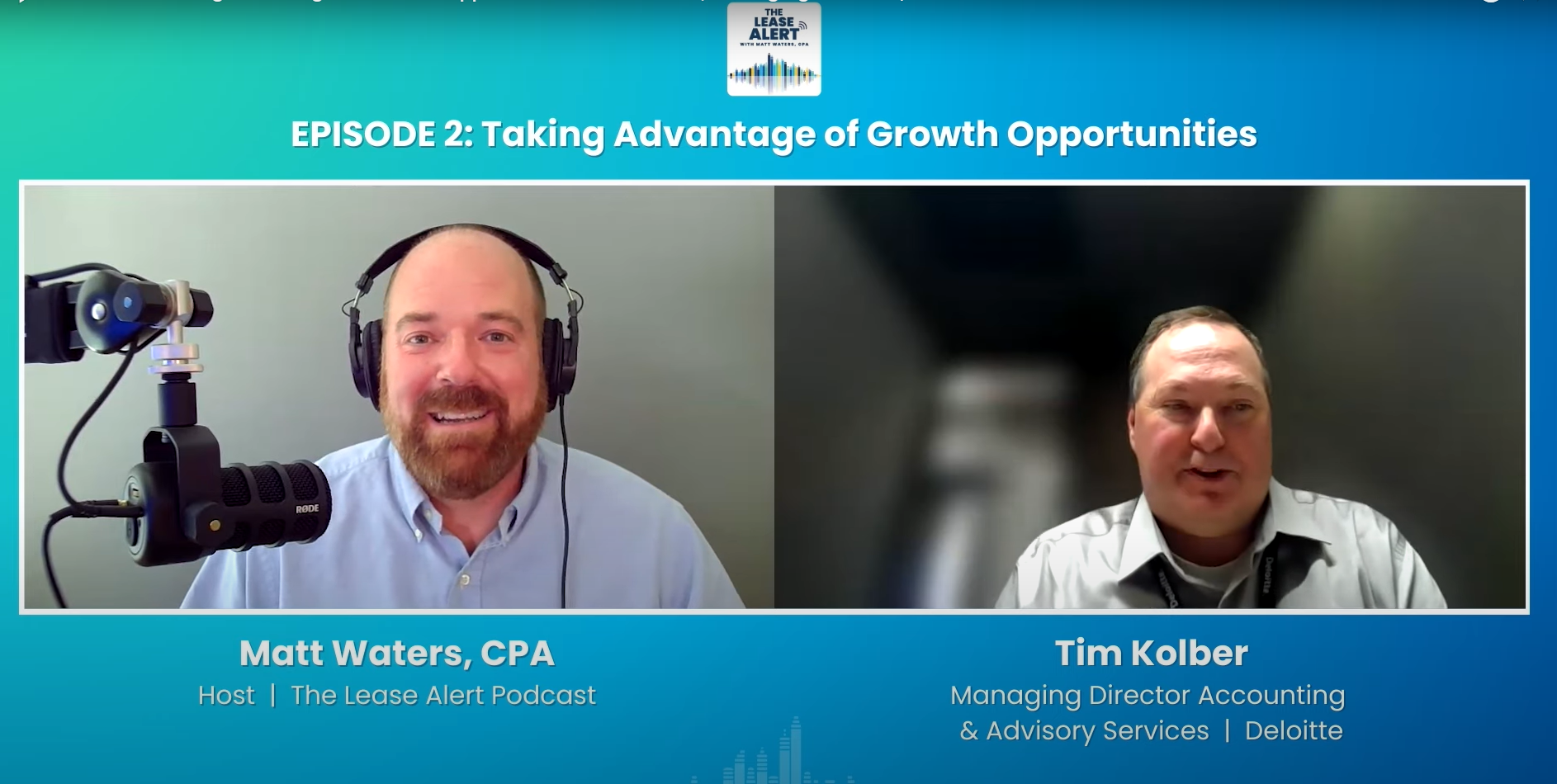Share this
by Matt Waters, CPA on March 24, 2025
Haven't checked out the first episode of The Lease Alert podcast yet? Now's your chance! Find out what accounting teams need to know about AI before it's too late. The following conversation has been lightly edited for clarity:
Matt Waters: Today's guest is the founder of an AI company. Ndonga Sagnia is a CPA with Big Four accounting firm experience. She also holds an MBA from Harvard Business School. Welcome to The Lease Alert podcast.
Watch the episode here or keep reading for all the best tips.
Ndonga Sagnia: Hi, Matt. Thanks so much for having me. Thank you for that really kind introduction.
Matt Waters: Oh, of course. Well, thank you for being here. And let's just dive right in. Let's talk about your background a little bit. And really specifically, why, after such an impressive background and resume and Harvard Business School, why did you decide to start this company and apply your skills to developing AI for accountants?
Ndonga Sagnia: So, I was really grateful to start out my career at Ernst Young. I think I built a lot of skills that I'm still using now, whether it's project management or breaking problems up into pieces. Who's responsible for what...managing in general. And of course, now what I'm doing, which is understanding the accounting landscape enough to start a company.
So, the why behind it was I left EY in 2021 for business school because I knew that I was still interested in the accounting space, but I did not necessarily want to do business audit or federal corporate tax. And so, I needed a space to really explore other areas of business, whether it was still focused in accounting or branching out into something else.
During my time at Harvard Business School, I spent a lot of my time talking to startup founders, taking classes on entrepreneurship and delving into new technologies. It's. And when I ran into generative AI, I was playing around with it for a completely different use case. I was testing it out for filtering harmful comments on the internet on social media platforms.
And I'm not someone who is active on social media. I'm sure if you look at my LinkedIn, you're thinking like, oh, she's lying, but I'm a founder. I have to post. But on LinkedIn, prior to the founding of my company, I had no post. I'm not, you know, on Instagram or anything like that. And I didn't really feel drawn to that use case, but then it hit me that, Hey, this technology, it's really fun, right?
People are using it for art. When I was at EY, I had to write tax review memos at the end of financial statement audits. I found it incredibly painful. I pulled all-nighters to get it done.
I couldn't delegate it down to junior staff, couldn't send it offshore to our lower-cost centers because we just didn't train them for technical writing. Right. So as a manager, it was on my shoulders and you know, I didn't have one or two audits at a time. I had five, six, seven.
And I hear the same thing now that I talk to audit managers in different companies. And I had gone to our managing partner at EY, I won't say what I said, and asked him, why haven't we figured out a way to automate any part of this? And his answer was "Oh, you know, maybe you'll figure it out." And I work 70, 80 hours a week.
I will not. I will not be figuring it, all right? I'm going to do my job. And this is a joke between him and I because we have a great relationship even now that I've left. So again, when I was playing with this technology, I thought, oh, this is it, right? This is the technology that could solve for my pain point in writing these tax review memos at the end of a financial statement audits.
And I spent some time talking to other accountants and I realized that, oh, I, I thought I had it bad having to write tax review memos. People who write technical accounting memos, one, they're writing them more frequently, but two, it involves a lot more research and a lot more analysis to get it done.
I thought this is a better place, a more acute pain point to start and this was before Chat GPT came out. So now. Some people listening are probably thinking, oh no, people are using gen AI for accounting. But really, this was before Chat GPT came out, and it was just GPT that you could play around with on OpenAI.
From there, I built a team and was really lucky enough to raise a small angel round and start tackling the technical accounting memos phase.

How AI will change lease accounting & auditing
Does tech equal trust?
Matt Waters: All right. Wow. Fascinating. I understand that your company's been included in some incubator-type programs. Can you tell us a little bit about those?
Ndonga Sagnia: Yeah, we're operating out of Harvard Business School. We were accepted into the Harvard Innovation Labs, which is a program for those who have created startups and applied. We get access to free workspace. That's where I'm calling from right now.
So that's been pretty great. And then I think most importantly for our company, not to knock the Harvard accelerator, but most important for our industry, we got accepted into the American Institute of CPA, a startup accelerator, which out of 150 applicants, they selected seven AI startups. And they provide us with a lot of programming, uh, resources, they make introductions for us.
They give us access to their conferences and opportunities to speak. And it's really been incredible.
Matt Waters: Wow, that's awesome. And later in this podcast, we're going to talk more about the accounting profession and the accountant shortage. And what's kind of interesting to me that it's hard to talk young, aspiring businesspeople to enter the profession of accounting. They view other professions as more interesting, but you know, you just said it right there. You've had some incredible opportunities and, you know, one of them is being involved with Harvard Business School, getting accepted into that accelerator program there.
Even more important for what you're trying to do is the connection with being a CPA and being a member of the AICPA, right? That's really encouraging to me, and I think should be a testament to the power of that designation, that CPA credential. I've always felt like it was well worth the time and effort.
It was hard, right? That was not an easy test to take, but ultimately it really does pay dividends throughout your whole career. And I love the way you said that, so thank you for that encouragement.

Experiencing difficulty hiring accountants of late?
If so, you’re not alone ...
Ndonga Sagnia: Yeah. Absolutely. It's so hard. And I think something that a lot of people don't know is that we have a lower pass rate than the bar.
So, you know, respect your accountants out there. But another thing is that going to business school and especially a school like Harvard, you're surrounded with people who've done incredible things. But one thing to highlight about working in public accounting: Not many people had managed as many people as I did.
I think I got here at what? I think I was 29. Now, you guys can Google my age, but by the age of 29, working in public accounting because of the leveraged model, you are coaching. As soon as you learn how to do something, it's time for you to teach the next person to do it because you're learning the next task.
So, I think that's something to highlight if you want early managerial experience. That's not just love. It really is needed to keep the business running. This is a good career to start with. It's not easy, but I'm so grateful for it.
Matt Waters: Well said. And I want to dive in a little deeper into the technical accounting memos.
We talked about the idea coming from tax memos during the audit process, but now it moved into the technical accounting memo space. And I've actually got some experience with these technical accounting memos. I used to run the lease accounting team at The Home Depot. And of course, Home Depot has hundreds of thousands of leases and a fairly common occurrence would be a new type of lease or a new arrangement that we did not have the accounting treatment documented for.
That would fall to me much like your story. I had a team in India, but they were not trained in accounting research. So really it would fall to me. I would research the technical accounting guidance. I would look at FAS 13 for the old lease accounting standard before it became known as ASCA 40.
And I would research that. I would basically craft a policy that I thought would satisfy business objectives and accurately reflect the transaction on Home Depot's financial statements. Then, my boss would review it, and we would talk it over with the auditors. Many times they would come back with questions or things.
I would look at the FASB material, and I would look at the Big Four accounting guides on the topic. Sometimes all four of the Big Four accounting guides. I quickly realized when I started doing that, you could get off track really easily.
One time, I remember researching something when we were in the lessee position for an accounting memo, and I thought I was on the right track. I was writing and really making progress. And then after a couple hours, I realized I had been in the lessor chapter!
It's not quite as easy to tell when you're doing Control/Find in a FASB document. But I had been on the wrong track for a couple of hours. And so my question is does that story resonate with why you're in this business?
I spent hours and hours grinding through these technical accounting memos. So, it sounds like your company is a way to help people like me get there faster. A sub question is how do you make sure the bot is on the right track? Even I was off track, so how do you direct the bot?
Ndonga Sagnia: Yeah, I would think a couple of things. And so I don't think I plainly stated this during this call, but our platform automates the first draft of the technical accounting memo. So the goal is to get users,70 percent of the way there for them to edit and review it on the back end. And so everything you described, I heard before, and it's very validating to hear talking to professionals.
And what we found is that again, similar to what I've stated is that people are not sending it offshore, but because of how much research goes into it, typically someone who is more technical and more senior usually works on it. Think of how long it took you to research it, and you're someone who had a background.
And if you were having someone who was three, four years in, it probably would have taken a lot longer, right? We're trying to truncate that time. When we're trying to keep the bot on the right track, we do something called prompt engineering. [It] is when you ask a question or you're trying to draft a memo, and there are actually a lot of questions, more than 10.
Behind the scenes, we have extra prompts that we send to the model based on your one, two, three questions, right? It provides more guidelines on how the bot needs to draft the memo, what sections need to be included, whose perspective it needs to be from - lesser or lessee. And then a second thing is, not to get too technical, but we've trained our system to extract the most relevant information from your inputs.
Let's say you're uploading a contract and uploading a lease agreement and you want to figure out the best treatment of this lease based on your policies, right? We've trained our system to pick up the most important things from your input and contract so as not to go off track.
That goes into the interpretive guidance and, um, authoritative guidance and extract the most relevant information and then synthesize it into a memo. And the last thing is, humans in the loop, right? We are not trying to replace accountants because we can't and because I have no incentive to.
Accountants are still important, so you as a professional can still go into the memo and highlight a section and say "Oh, we do write this from this perspective". It might be because you changed your mind or because you're not happy with the quality of the output. It's like having the smartest, most efficient senior that you've ever had.
It takes about two to five minutes after you prompt it to get a full memo. You can probably start reading it because it starts generating while it's loading.
You can probably start reading it within a minute or so. And all this research is happening in a matter of seconds and then the drafting part starts. So, you can go back and forth and instead of having a couple of hours turnaround from delegating this down, or a couple a days turnaround, you're getting a couple of seconds turnaround to implement your changes.
Matt Waters: Wow. That's actually a pretty good way to sell the bot - comparing it to the smartest, most efficient senior. Let me just take a sidebar here. You called it a model. I've been calling it a bot, and some people call it AI. What do you think? What's the right one?
Ndonga Sagnia: I try to not be restrictive about it because I think it doesn't really matter what it's called. And in a way, I want people to call it whatever makes it more comfortable for them. I don't want people to feel like they're Gen AI experts, right? How many of us are cloud experts? I'm not, but we use the cloud all the time.
We save our documents on it and we work on it. And I don't think that we need to get caught up in technical jargon. I think sometimes I'll be on a call with someone and they'll correct me on what the platform's called. I'm like, "Let's run with it and I'll try to I'll try to use their lingo". So yeah, I want to normalize and get people comfortable with it in whichever way they want to call it. I called it "model" because I think I'm deep into the production side with my team. We're talking about what do we need to do to get this output to be more concise.
What do I need to do to get it more detailed? And so, we're talking about the specific model on the backend that's being used, but it is a bot. I think it makes sense that you're calling it a bot because from your standpoint, you could just care about the output. You can hear about the work it does. You don't care about how it's made.
Matt Waters: Well, that takes a lot of pressure off. We're trained to have professional skepticism, right? That's a good thing. Employers and the public need that skill set. I think that's part of why perhaps we're getting some objections related to this type of technology, even from the ranks of accountants.
How can you be sure that the bot is to be trusted? How do we know that it's complete and accurate?
Some companies have a strict "No AI" policy. I would be interested in hearing how you're overcoming objections. How are you talking with people who really just don't trust AI?
Ndonga Sagnia: In a weird way, thank goodness for Chat GPT. People are thinking about it more. It's more on top of mind.
But I will say I have run into people who say, I don't want to use it, I don't want my staff using it. I don't want anyone using it. I know AI is not a policy, right? Your AI policy cannot be “Don't use any AI.” It's going to leave your company behind. I talk to accounting firms every day, and there are so many for building - AI tools, buying AI tools, integrating with AI tools, testing out AI tools.
Not everyone has deployed them internally, but there are quite a few people already working on figuring out what use cases to deploy tools towards. I would say, "What are your concerns?"
The typical concerns that come out are security. Things like effectiveness, and then "build or buy" paralysis. Do we spend money on technology tools? Do we try to build things in-house? We might have the right people to try to build them in-house. And I think starting with security, A key part of policies is deciding who has access to it within your company, and what type of information can be uploaded in the tool.
Like I spoke to someone from a midsize accounting firm, and they said "When I use tool A, I can't upload client information into it. But when I use tool B, I can." Obviously this company has actually done a great job, not only in implementing technology, but in training their teams such that a manager [has guidance]. This wasn't an innovation manager or technology manager.
He was a technical accounting advisory manager. He was just a regular employee who had gotten enough training to be allowed to use different technologies effectively without putting his company at risk. And so I think the training aspect when it comes to security is important. And then obviously looping in the stakeholders that are important.
So, someone on your technical side probably had to be involved with understanding that this tool is, for example, SOC 2-compliant. So, we are more comfortable with it. A question that I get is "Are you training a central model with our inputs?" They don't want their customer information leaking or their private IP leaking. If there's a certain way that they write memos, they don't want that leaking either. We have to answer that we don't have a choice. It's a giant central model that's just learning from everybody's information, and then we're going to be the best accounting bot ever.
I do think we're going to be the best accounting bot ever, but it's not going to be because we're just consolidating and compounding in that way. No, because we understand the security risks, and we want people to be able to upload private information in.
Testing it out with your team. I think partners and, uh, CTOs, CIOs, CEOs, all these very important people are not always the best people to determine how effective a tool is going to be. Pull in your juniors, and pull in the people that are spending 60, 70 hours a week doing some of this work in busy season. Let them touch the platform.
Let them ask the people selling the software or building the software "What is it going to do?" Let them interact with the user interface. So, making something usable for someone who is not technical is important.
Matt Waters: This ties in with the current other hot topic that's going on in the profession, which is the shortage of accountants.
So, what are your thoughts on how can AI be used? I'd say two things. One, to shore up the shortage. And two, to make the profession more interesting.
Ndonga Sagnia: Yeah, I think accounting is in a unique spot where we need very educated people to work in accounting, especially in technical judgment spaces.
And so, I do think that's why we've run into this issue when it comes to attrition and people who are already in the space pivoting into other business roles, as you mentioned, but also the pipeline not looking good, Gen Z, they're not super excited about accounting. I don't think Gen Alpha is either.
And I think that AI and the use of technology will be helpful in two ways. Of course, if you're doing this work more quickly, it is helping to fill the gap of, okay, we don't have six people to do this. We only have two, but now we can do as much work as the six people with using this technology. But I think a second thing is it's a helpful retention tool.
Raise accountants up from spending time on tedious tasks and let them use their judgment and their professional experience to interact with and influence other areas of the business. And so I think that's for the most part, one of the reasons that people go into accounting or go into business. They're not just excited to work on journal entries, and they're not just excited to spend hours like you did going into do interpretive guidance and going into authoritative guidance - though I have met out of my hundreds of interviews, two people who said they actually love that.
But the majority do not. So, two out of a couple of hundred is not a good metric. The majority of people don't want to do that. They go into business because they are interested in building something. They are interested in growth. They are interested in using their judgment to make decisions that will have financial implications on the back end.
When you are not doing the journal entries and when you're not doing the hours of research, you are then able to be this impactful professional that I think most of us went to school to be. I think it's also, on a very basic level, a more fun way to do your job. I never get over doing a demo and having someone interact with our platform and the shock of having something respond to you as if another person typed it on the other end having it actually be useful for you.
I think that delight is worth it. It's a selling point. And it's also something that people can look forward to who are working at companies, especially if you're pulling in junior staff and building in internal champions. That's something else that's exciting that they can work on that is helpful to the business, but also challenging and rewarding from the employee standpoint.
Matt Waters: Wow. Yeah. I mean, that's really compelling. You know, the pace of business is only increasing, right? The complexity of accounting is only increasing. It's kind of a no-brainer. Who wants to grind through hours and hours of tedious research?
You could get at least, let's just say 75 percent of the way there through the model that your company provides, and then apply your judgment, your own experience, and even your professional skepticism to make sure it is the right memo for that company at that time.
That work sounds much more fulfilling than actually starting with a blank sheet of paper, right? I think we're quickly getting to the point where it's going to be impossible to start every single accounting memo with a blank sheet of paper. Not even that anybody would want to do that, but it's just physically going to be impossible to manage that much work.
So, you know, it's really helping on two fronts there: Making the work more interesting and giving accountants a fighting chance to get all the work done in a reasonable amount of hours.
You want the work to be more interesting and meaningful. You want them to actually be able to go home and spend time with their families at night. All of this is enabled by what you're doing at Time Credit. I don't see a downside to this, really. That's fascinating. What else do you want to share with the audience as we wrap up?
Ndonga Sagnia: We have two main products out right now. We have the chatbot, which is the technical accounting chatbot, and we have the document generator. And this is not just for public accounting firms. I think I've leaned towards the public accounting firm standpoint, but it's also for internal teams.
Accounting teams can use this to help them and they can then lean on their auditors or advisors after the fact, but it saves on billing time as well. So, I'm easy to reach. I'll share my details. I think Matt will share it more. This is an exciting time.
I will say, even if you're not interested in working with Time Credit, I encourage everybody to play with AI in their daily lives. And I really encourage leadership to take it seriously in accounting and finance use cases for marketing. You must have an AI policy and AI initiative.
Matt Waters: Well said, and there you have it, folks. That's Ndonga Sagnia, AI expert, CPA. Harvard MBA, and now our latest guest on the Lease Alert podcast. Thank you for listening to The Lease Alert. I'd be grateful if you would like and subscribe wherever you listen. Until next time, keep learning and leasing.

Share this
- Lease Accounting Software (90)
- ASC 842 (83)
- Accounting Teams (53)
- Lease Administration Software (27)
- Retail Tenants (16)
- Commercial Real Estate (14)
- Lease Management (13)
- Real Estate Teams (10)
- ESG (8)
- Market Data and Analytics (8)
- Success Stories (8)
- News and Media Coverage (5)
- Transaction Management Software (2)
- frs 102 (2)
- Customer Success (1)
- Healthcare real estate (1)
- Office Tenants (1)
- December 2025 (1)
- September 2025 (1)
- July 2025 (2)
- June 2025 (4)
- May 2025 (2)
- April 2025 (2)
- March 2025 (6)
- February 2025 (3)
- January 2025 (4)
- December 2024 (1)
- October 2024 (4)
- September 2024 (2)
- August 2024 (4)
- July 2024 (3)
- June 2024 (3)
- May 2024 (4)
- April 2024 (1)
- February 2024 (1)
- December 2023 (4)
- November 2023 (6)
- October 2023 (4)
- September 2023 (2)
- August 2023 (2)
- July 2023 (3)
- May 2023 (2)
- March 2023 (1)
- February 2023 (3)
- January 2023 (1)
- December 2022 (3)
- November 2022 (4)
- October 2022 (4)
- September 2022 (1)
- August 2022 (4)
- June 2022 (1)
- May 2022 (4)
- April 2022 (8)
- March 2022 (3)
- February 2022 (1)
- January 2022 (2)
- November 2021 (2)
- October 2021 (2)
- September 2021 (3)
- August 2021 (15)
- July 2021 (3)
- June 2021 (1)
- May 2021 (1)
- April 2021 (3)
- March 2021 (1)
- January 2021 (1)
- December 2020 (3)
- November 2020 (1)
- October 2020 (2)
- September 2020 (2)
- August 2020 (3)
- July 2020 (2)
- June 2020 (3)
- May 2020 (1)
- April 2020 (1)
- March 2020 (1)
- February 2020 (1)
- December 2019 (1)
- October 2019 (1)
- September 2019 (2)
- August 2019 (3)
- July 2019 (2)
- April 2019 (69)
- October 2018 (1)
- August 2018 (1)
- July 2018 (1)
- June 2018 (1)
- May 2018 (1)
- April 2018 (2)
- March 2018 (3)
- February 2018 (2)
- December 2017 (1)
- August 2017 (3)
- June 2017 (2)
- May 2017 (2)
- April 2017 (1)
- March 2017 (2)
- January 2017 (2)
- November 2016 (2)
- July 2016 (1)
- June 2016 (1)
- July 2015 (1)
- March 2015 (1)
- June 2014 (1)
- April 2014 (11)
- October 2011 (1)
You May Also Like
These Related Stories

Hot Topics & Emerging Trends in Lease Accounting

How Lease Accountants Can Focus on Learning, Become Experts and Help Others



